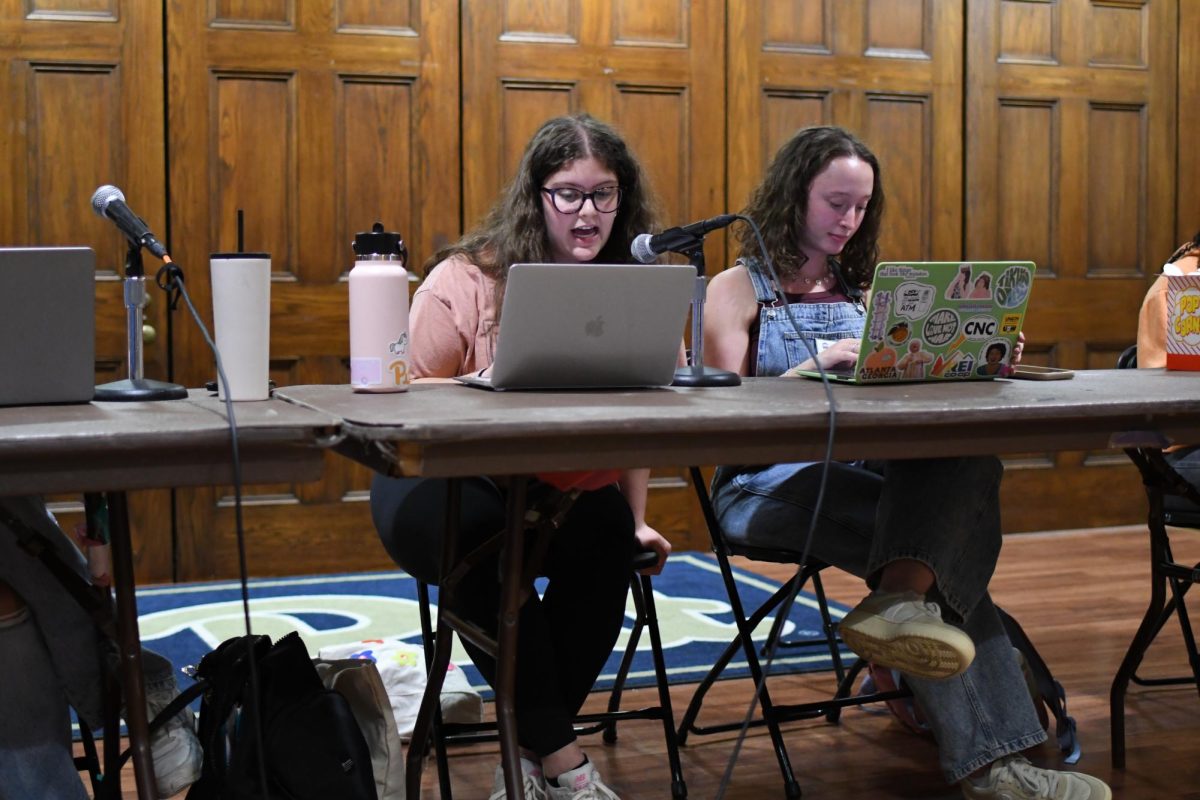Pitt Student Government Board held a public debate to introduce the candidates for the two vacant board positions during its meeting on Tuesday in Nordy’s Place.
The candidates included Andrew Elliott, Haiwei Hu and Shanthi Bhaskar. SGB President Sarah Mayer began the questioning by asking the candidates to outline their top priorities if elected.
“It’s been very clear over the past few years that food safety is not taken seriously enough on campus,” Elliott said. “We need to hold them accountable when we have things like maggots in our broccoli and undercooked chicken.”
Bhaskar added her concerns about food accessibility for students with dietary restrictions.
“A focus for me is making sure there are enough options for all the students who have dietary restrictions,” Bhaskar said. “It’s a necessity that has to be addressed.”
Elliott responded with his concerns about the improper labeling of allergen-free foods on campus.
“[Proper labeling] is something that food service repeatedly fails to do,” Elliott said. “In the most severe cases, several people who I’ve spoken to have had allergy responses to things that were labeled as allergy friendly when they weren’t.”
Hu also spoke about food accessibility, but focused more on student’s access to grocery stores.
“I know SGB has previously done work to increase our accessibility to grocery stores. I think we really need to help students feel secure,” Hu said.
Mayer asked the candidates what their ideal relationship with the administration would be and how they plan to use it to advance their initiatives.
“We have to have a good relationship with staff in order for us to continue making positive impact,” Bhaskar said. “SGB can’t be the only liaison connecting the student body to administration. We have to make students feel comfortable enough to bring up their concerns.”
Elliott cited this as one of his most “prevalent” initiatives, stating “eight people is just not enough to represent a student body of 20,000. We have to push for better access to admin.”
Mayer invited the candidates to share possible solutions to improve student safety on campus.
“Some of the best things we can do are community based,” Elliott said. “We can increase lighting and create more programs like SafeRider. We can work closely with mental health services to help students through those abrupt events.”
Hu added his concerns about police brutality on campus, specifically during protests.
“In the wake of the Palestine protests, we see what police do,” Hu said. “They can beat up students, they bloody students and they send students to the hospital with stitches.”
Mayer asked the candidates how they would advocate for students of color on campus.
“There’s so many different communities who help include students who feel disconnected,” Bhaskar said. “Clubs are a really important part of making students feel safe and like they have a community they belong to.”
“Centralizing the power of those communities can be really important,” Elliott said. “We can serve a role in focusing that power by making sure we listen to those communities that have a smaller voice.”
Mayer opened the floor for closing remarks from the candidates.
“We’re a limited-scope organization, so we need to focus our attention where we can do the most good for the most students,” Elliott said.
“SGB is doing a lot of great stuff, but there’s just so much more to always be done,” Bhaskar said. “We have to choose the action items that are important to our community and get more student voices on those topics.”
During the meeting before the debate, Mayer addressed the resignation of board member Katie Emmert.
“Katie Emmert has resigned from her position on the board as of Sunday due to personal capacity and mental health issues,” Meyer said. “We’re really thankful for Katie. She’s done some great initiative work and we love her here at SGB.”
Elliott, who also serves as Wellness Chair, provided updates on a safety inspection conducted on the Eatery this week following complaints about food quality.
“The health inspection on The Eatery was concluded, and of the six items on their checklist that were investigated, all six came back as satisfactory, the second-highest ranking on their scale,” Elliott said.
Allocations:
Women in Business requested $2,826.82 to attend a conference. The board amended and approved this request to $2,166.68.
Chabad House on Campus requested $40,000 to hold an event. The board denied this request in full.
Interfraternity Council requested $2,350 for dues. The board approved this request in full.
Chabad House on Campus requested $9,000 to distribute items on campus. The board approved this request in full.


